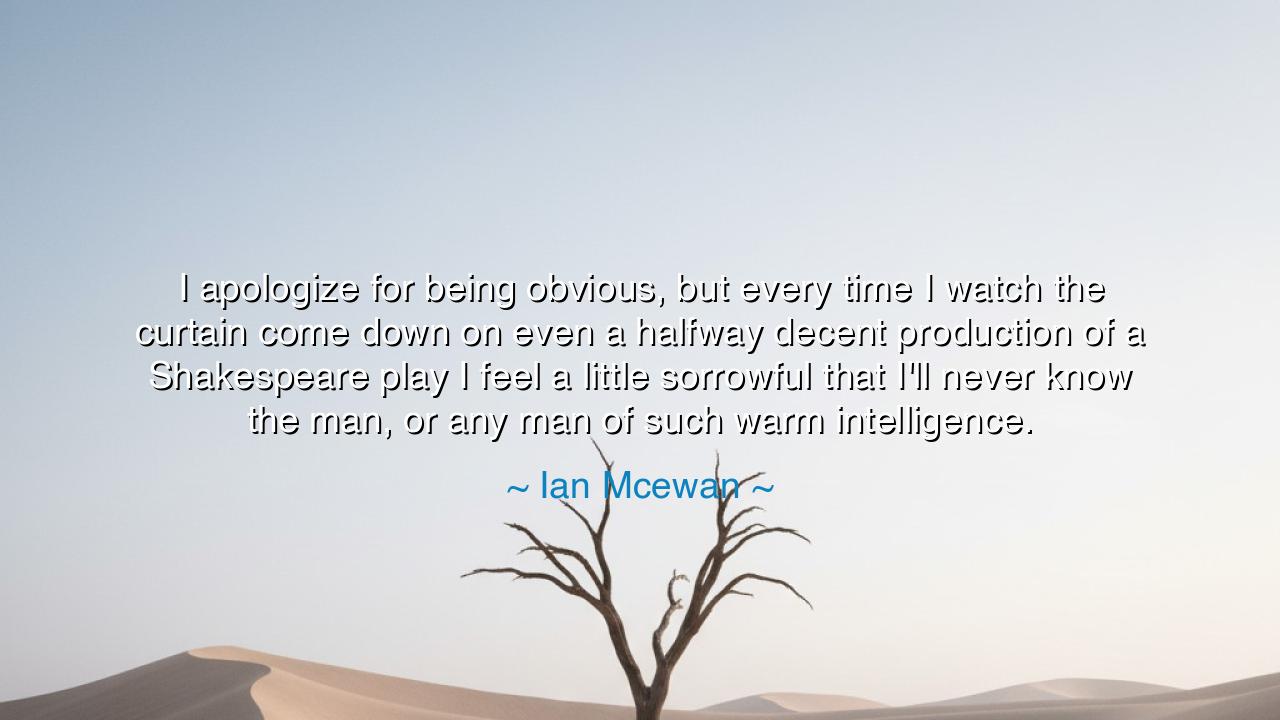
I apologize for being obvious, but every time I watch the curtain
I apologize for being obvious, but every time I watch the curtain come down on even a halfway decent production of a Shakespeare play I feel a little sorrowful that I'll never know the man, or any man of such warm intelligence.






In the tender and reflective words of Ian McEwan, the novelist whose prose captures both the ache and wonder of human thought, we find a confession that reaches across centuries: “I apologize for being obvious, but every time I watch the curtain come down on even a halfway decent production of a Shakespeare play I feel a little sorrowful that I'll never know the man, or any man of such warm intelligence.” In this line, McEwan gives voice to a feeling known to all who stand in awe before genius — that bittersweet yearning to commune with a mind so vast, so human, so filled with light, that its absence feels like a kind of loss. His sorrow is not only for Shakespeare, but for the unreachable heights of human possibility embodied in him — a warmth of intellect and empathy so great that even centuries cannot dim it.
The origin of this quote lies in McEwan’s reflections on art, humanity, and the enduring presence of William Shakespeare, whose words have outlived empires and revolutions. McEwan, himself a craftsman of language and insight, recognizes in Shakespeare not merely a writer, but an embodiment of universal understanding — a man who could peer into every heart, from kings to fools, and reveal their truth with tenderness and precision. When McEwan speaks of “warm intelligence,” he means more than wit or cleverness. He means the rare union of mind and mercy, of brilliance that does not judge, but comprehends. It is that combination — intellect fused with compassion — that makes Shakespeare’s genius both formidable and deeply human.
To feel sorrow at never knowing Shakespeare is to feel the ache of separation from one’s own potential. For in him, McEwan sees not a god, but a mirror of what mankind could be at its best — curious, imaginative, and endlessly forgiving. Shakespeare’s plays hold no hatred, only understanding; no finality, only reflection. He shows us that even in tragedy, the human heart contains grace. Thus, McEwan’s melancholy arises from reverence — from knowing that such a mind once walked among us, yet is now forever beyond our reach. It is the same sorrow that stirs when one stands before the ruins of ancient civilizations or gazes upon the stars — the awareness that greatness is both timeless and fleeting, that beauty exists just long enough to remind us of what we are missing.
History gives us many who have felt this same longing. The poet John Keats, on reading Homer in translation, wrote that he felt as though he had discovered a new planet. The experience of encountering genius, for Keats as for McEwan, is both exalting and humbling — it makes one feel infinite and small at once. When McEwan watches the curtain fall, he feels what Keats felt — that tremor of awe and grief before something immortal. For every performance of Shakespeare is not only art revived, but a conversation with the dead, a fleeting communion with a mind that still speaks, though the body is dust.
And yet, McEwan’s words hold not despair, but gratitude. His apology for being “obvious” is modest — for what he says is simple, but profound. He acknowledges that Shakespeare’s genius cannot be possessed, only approached; it must be encountered humbly, as one encounters truth itself. To know that we will never meet Shakespeare is to accept the limits of time, but also to rejoice that he lived at all — that his words still bridge the centuries, allowing us to glimpse, however briefly, the eternal humanity within him.
The lesson here, my child of wonder, is to cherish the legacy of those who have lifted the human spirit higher than their own lives. Do not mourn only that you cannot meet them; instead, seek to know them through their works, for in every play, every line, every act of creation, their spirit breathes still. The greatness of such minds is not meant to make us feel small, but to inspire us toward our own fullness — to remind us that empathy, imagination, and intellect are not rare gifts but human callings.
So when you next behold a play, a painting, a poem, or a work of wisdom that stirs your soul, remember McEwan’s sorrow, but also his reverence. Let that yearning to know the artist become a spark to know yourself more deeply. For though you will never meet Shakespeare in the flesh, his warm intelligence already dwells within you, as it dwells in every heart that feels, imagines, and seeks to understand. The curtain may fall, but the play of human genius never ends — it continues in every act of creation, every word of kindness, every mind that dares to love the world as he did.






AAdministratorAdministrator
Welcome, honored guests. Please leave a comment, we will respond soon